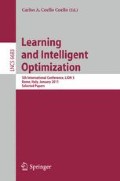Abstract
The ability to visualise how algorithm performance varies across the feature space of possible instance, both real and synthetic, is critical to algorithm selection. Generalising algorithm performance, based on learning from a subset of instances, creates a “footprint” in instance space. This paper shows how self-organising maps can be used to visualise the footprint of algorithm performance, and illustrates the approach using a case study from university course timetabling. The properties of the timetabling instances, viewed from this instance space, are revealing of the differences between the instance generation methods, and the suitability of different algorithms.
Access this chapter
Tax calculation will be finalised at checkout
Purchases are for personal use only
Preview
Unable to display preview. Download preview PDF.
References
Hill, R., Reilly, C.: The effects of coefficient correlation structure in two-dimensional knapsack problems on solution procedure performance. Management Science, 302–317 (2000)
Corne, D., Reynolds, A.: Optimisation and Generalisation: Footprints in Instance Space. In: Schaefer, R., Cotta, C., Kołodziej, J., Rudolph, G. (eds.) PPSN XI. LNCS, vol. 6238, pp. 22–31. Springer, Heidelberg (2010)
Smith-Miles, K., van Hemert, J., Lim, X.: Understanding TSP Difficulty by Learning from Evolved Instances. In: Blum, C., Battiti, R. (eds.) LION 4. LNCS, vol. 6073, pp. 266–280. Springer, Heidelberg (2010)
McCollum, B., Schaerf, A., Paechter, B., McMullan, P., Lewis, R., Parkes, A.J., Gaspero, L.D., Qu, R., Burke, E.K.: Setting the research agenda in automated timetabling: The second international timetabling competition. INFORMS Journal on Computing 22(1), 120–130 (2010)
Burke, E.K., Mareček, J., Parkes, A.J., Rudová, H.: Decomposition, reformulation, and diving in university course timetabling. Computers & Operations Research 37(3), 582–597 (2010)
Lopes, L., Smith-Miles, K.: Generating applicable synthetic instances for branch problems, under review (2011)
Gaspero, L.D., McCollum, B., Schaerf, A.: The second international timetabling competition (itc-2007): Curriculum-based course timetabling (track 3). Technical report, DIEGM, University of Udine (2007)
Rice, J.: The Algorithm Selection Problem. Advances in Computers 15, 65–117 (1976)
Lopes, L., Smith-Miles, K.: Pitfalls in Instance Generation for Udine Timetabling. In: Blum, C., Battiti, R. (eds.) LION 4. LNCS, vol. 6073, pp. 299–302. Springer, Heidelberg (2010)
Müller, T.: Itc2007 solver description: A hybrid approach. In: Proceedings of the Seventh PATAT Conference (2008)
Culberson, J., Luo, F.: Exploring the k-colorable landscape with iterated greedy. In: Cliques, Coloring, and Satisfiability: Second DIMACS Implementation Challenge, pp. 245–284 (1996)
Beyrouthy, C., Burke, E., Landa-Silva, D., McCollum, B., McMullan, P., Parkes, A.: Threshold effects in the teaching space allocation problem with splitting. European Journal of Operational Research (EJOR) (2008) (under review)
Pfahringer, B., Bensusan, H., Giraud-Carrier, C.: Meta-learning by landmarking various learning algorithms. In: Proceedings of the Seventeenth International Conference on Machine Learning Table of Contents, pp. 743–750. Morgan Kaufmann Publishers Inc., San Francisco (2000)
Wood, D.: An algorithm for finding a maximum clique in a graph. Operations Research Letters 21(5), 211–217 (1997)
Kohonen, T.: Self-organized formation of topologically correct feature maps. Biological Cybernetics 43(1), 59–69 (1982)
SOMine, V.: Eudaptics software Gmbh
Knowles, J., Corne, D.: Towards landscape analyses to inform the design of a hybrid local search for the multiobjective quadratic assignment problem. In: Soft Computing Systems: Design, Management and Applications, pp. 271–279 (2002)
Bierwirth, C., Mattfeld, D., Watson, J.: Landscape regularity and random walks for the job-shop scheduling problem. In: Gottlieb, J., Raidl, G.R. (eds.) EvoCOP 2004. LNCS, vol. 3004, pp. 21–30. Springer, Heidelberg (2004)
Schiavinotto, T., Stützle, T.: A review of metrics on permutations for search landscape analysis. Comput. Oper. Res. 34(10), 3143–3153 (2007)
Author information
Authors and Affiliations
Editor information
Editors and Affiliations
Rights and permissions
Copyright information
© 2011 Springer-Verlag Berlin Heidelberg
About this paper
Cite this paper
Smith-Miles, K., Lopes, L. (2011). Generalising Algorithm Performance in Instance Space: A Timetabling Case Study. In: Coello, C.A.C. (eds) Learning and Intelligent Optimization. LION 2011. Lecture Notes in Computer Science, vol 6683. Springer, Berlin, Heidelberg. https://doi.org/10.1007/978-3-642-25566-3_41
Download citation
DOI: https://doi.org/10.1007/978-3-642-25566-3_41
Publisher Name: Springer, Berlin, Heidelberg
Print ISBN: 978-3-642-25565-6
Online ISBN: 978-3-642-25566-3
eBook Packages: Computer ScienceComputer Science (R0)

